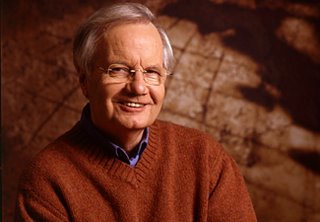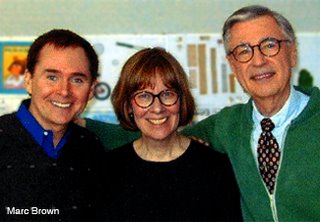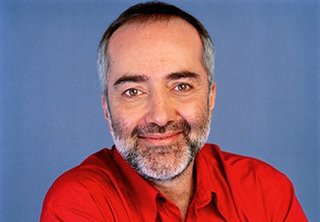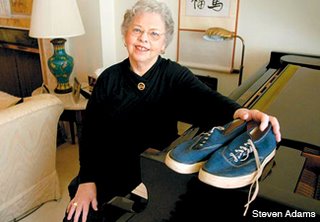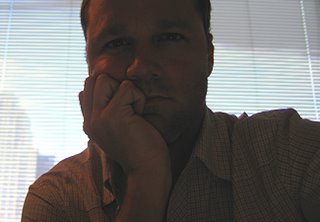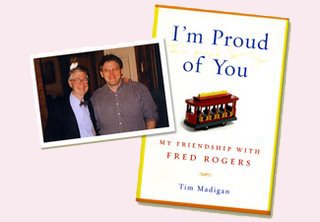
Chris and I were standing outside of NPR's Studio 3A listening to South-African singer-songwriter Vusi Mahlasela perform on
"Talk of the Nation." Moments prior, we had interviewed the incomparable Susan Stamberg, and hours before that, "Meet The Press" host, Tim Russert.
As
Vusi, to whom we had just been introduced by our gracious NPR hostess Gemma Hooley, broke into the plaintive, spine-tingling chorus of "Silang Mabele" ("The Beauty of Our Land"), I steadied myself against the glass and thought, "Mine is a blessed life."
Our day of "Mister Rogers & Me" interviews was long, but so meaningful. It began with with a six o'clock wake up call. Of course, I had been lying in bed for hours, rolling questions over and over in my head. For me, the questions were all about connections. How did they come to know Fred Rogers? How did they feel their life work overlapped?
As an interviewer, your job is to immediately establish rapport, contextualize your interview, demonstrate that you've done your homework, all while keeping the conversation on target. Fortunately, with pros like Tim Russert and Susan Stamberg, it's an easy job.
Kind of. Collectively, Tim and Susan have interviewed thousands of the world's most influential, creative, and important people: Rosa Parks, Bill Clinton, Hamid Karzai, Condoleezza Rice, Dave Brubeck, Pervez Musharraf, and Luciano Pavarotti to name just a few. The pressure motivates a guy to do his homework, and (as one Newhouse professor used to say upon handing out blank blue books), dazzle.
We interviewed Tim in a generic conference room at NBC's Washington bureau. Chris scrambled to light it, and create a compelling shot, while I paced the room reading my questions over and over. Five minutes before Tim was scheduled to join us, Chris hadn't gotten the mics to work. "Dude, run out to the truck and get me the shotgun mic, will ya'?" By the time I returned from my brisk, anxious walk through the damp morning, he'd remedied the problem. Tim walked in a few minutes later.
"When I told friends and colleagues that I would be interviewing you," I said, "They all suggested I impress you with some Buffalo Bills trivia."
"Go Bills!" he replied, almost Pavlovianly.
"But since I know nothing about football, I brought you some H & H bagels from your old neighborhood."
Rapport: established.
The interview breezed by. I drew connections between his father (about whom, Tim's written the memoir, "Big Russ & Me") and Fred Rogers, as well as "Meet The Press" (American's longest running network program) and "Mister Rogers Neighborhood" (America's longest running public television program). Like I said, he's a pro. Ask the question, and you get a perfectly formed sound bite in return. (As Chris said later, "Everything Tim said is usable.") I expected him to be articulate, though. What I didn't expect was his warmth, and his authenticity. What I didn't expect was that his eyes would absolutely sparkle.
Afterwards, after we'd established that we were his colleagues nephews ("Oh, so your Iowa boys, huh? Corn fed and cow licked!"), after we'd snapped a quick photo, and agreed to send him a copy of the film, and invite him to the premiere, Chris and I just looked at each other, smiled, then began packing for the next shoot.

I have long been a fan and supporter of National Public Radio. On long stretches of interstate, and lonesome nights alike, Susan Stamberg, Noah Adams, and Bob Edwards have been constant, steadfast companions. To tour their facilities, then, is a fan boy thrill. To interview "The Founding Mother of Public Radio" was better still.
The organizations mission is painted in silver letters on an ivory wall just inside the front door of NPR's Massachusetts Avenue lobby.
The mission of NPR is to work in partnership with member stations to create a more informed public -- one challenged and invigorated by a deeper understanding and appreciation of events, ideas and cultures. To accomplish our mission, we produce, acquire, and distribute programming that meets the highest standards of public service in journalism and cultural expression; we represent our members in matters of their mutual interest; and we provide satellite interconnection for the entire public radio system.
I was barely inside the door, and already Mister Rogers' "deep and simple" ethos was affirmed. I was barely inside the door, and already Mister Rogers challenge to me had born fruit.
A half an hour later, as Chris and I set up Studio 5C under the watchful eye of Press Relations Intern Kyle Loden, Ms. Stamberg swooped gracefully through the door.
"Hello, gentleman," she said her familiar, raspy voice.
Ms. Stamberg was gracious, humble, warm, and lit from within. She smiled the whole time (as any longtime listener might imagine by the sound of her voice). She was engaged, and engaging, and patiently regaled us with stories about the two PBS programs she hosted with Fred, as well as the numerous times she called on him on air to contextualize world events for children. She even brought a photo of she and Fred. "I always love to look at his hands," she said. "He told me that 'Television is a medium of small gestures,' and I always remembered that."
Afterwards, Gemma joined us as we broke down our equipment. Then she gave us the grand a tour (Corey Flintoff in the elevator! David Kestenbaum in the newsroom!), introduced us to Vusi, and sat us down just outside the control room.
"The world is shrinking now," Vusi told Lynn Neary. "Your neighbor's problem is also your problem."
I smiled, and felt a rush of warmth inside. The hours of driving, the lack of sleep, the anxiety and uncertainty and ambiguity of it all slipped away as I realized how fortunate I am to have this inheritance, to have these friends, these experiences, and these opportunities. Then Vusi finished his thought.
"How much do you want to belong?"


